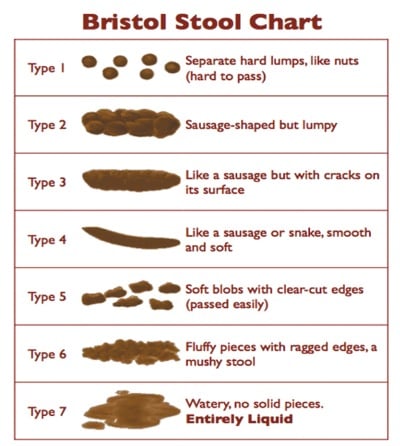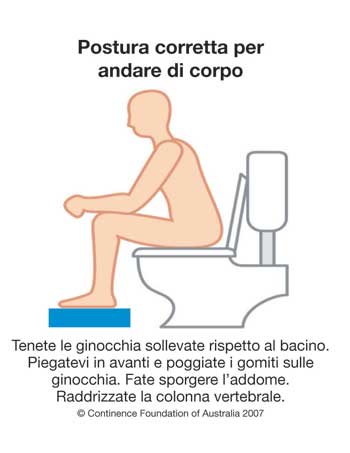|
This fact sheet explains what constipation is and suggests some ideas for improvement and tells you where to get more help. |
Questo foglietto informativo spiega cos’é la stitichezza, suggerisce idee per migliorare il problema e vi indica dove potete trovare ulteriore sostegno. |
What is constipation?Constipation is a common disorder where bowel actions ('poo' or faeces) are not easily and/or less frequently passed. Symptoms of constipation include:
|
Cos’é la stitichezza?La stitichezza é un disturbo comune in cui i prodotti delle attività intestinali (“cacca”o feci) non vengono eliminati facilmente e/o frequentemente. Tra i sintomi della stitichezza vi sono:
|
What does being 'Regular' mean?
|
Che cosa significa essere ‘regolari’?
|
What can cause constipation?
|
Che cosa può causare la stitichezza?
|
What should your 'poo' look like?Your poo should be light or dark brown, sausage-shaped, soft but firm, easy to pass and with minimal odour. Aim to have a type 3 or type 4 bowel action.  |
Che aspetto dovrebbero avere le vostre feci?Le vostre feci dovrebbero essere di colore marrone chiaro o scuro, della forma di una salsiccia, morbide ma sode, facili da eliminare e dal minimo odore. Il tipo ideale di feci è il 3 o il 4.  |
Common Bowel ProblemsFaecal Impaction - When constipation causes faeces to pack the intestine (digestive tract) so tightly that your normal pushing action in the toilet is not strong enough to push the faeces out. Faecal Incontinence (sometimes referred to as 'soiling') - This is the accidental loss of liquid or solid faeces. This can be due to the bowel (which stores the faeces) being too full, but this may be only one of the causes. Uncontrolled flatus ('wind') is often considered evidence of faecal incontinence. Haemorrhoids (sometimes referred to as 'piles') - This can be the result of straining to have a bowel movement. This strain (similar to heavy lifting) can damage the rectum's veins. This can cause bleeding, soreness and itching. Rectal Prolapse - This occurs when long-term straining causes a small amount of bowel lining to push out from the anus, which is a ring of muscle that opens and closes when we pass a bowel motion. |
Problemi intestinali comuni
Ingombro fecale – Si ha quando la stitichezza provoca nell’intestino (tratto digestivo) un accumulo di feci che si ammassano in maniera così compatta che il normale sforzo di evacuazione in bagno non é abbastanza intenso da espellerle.
Incontinenza fecale (a volte definita anche ‘soiling’) – Si tratta della perdita involontaria di feci solide o liquide. Questa può essere dovuta al fatto che l’intestino (che contiene le feci) sia troppo pieno, ma é solo una delle possibili cause. Episodi di flatulenza involontaria (perdita di gas) sono spesso considerati sintomo di incontinenza fecale.
Emorroidi (a volte chiamate anche ‘ragadi’) – Possono essere provocate dallo sforzo prolungato per cercare di andare di corpo. Questo sforzo (simile al sollevamento di carichi pesanti) può danneggiare le vene del retto. Ciò può causare sanguinamento, infiammazioni e prurito.
Prolasso rettale – Si verifica quando lo sforzo di evacuare prolungato nel tempo provoca la fuoriuscita di una piccola parte del rivestimento intestinale all’esterno dell’ano, che é un anello muscolare che si apre e si chiude quando andiamo di corpo.
|
How constipation affects bladder controlConstipation can cause accidential leakage from your bladder. An overfull bowel will cut down the volume of urine your bladder can hold and you will feel the need to go to the toilet often and in a hurry.  |
In che modo la stitichezza influisce sul controllo della vescicaLa stitichezza può causare perdite involontarie della vescica. Un intestino troppo pieno ridurrà il volume di urina che la vescica riesce a contenere e sentirete la necessità di andare in bagno spesso e con urgenza.  |
Here are five ways to keep your bladder and bowel healthy and prevent constipation:Eat well to keep your bowels regular and to have a healthy body weight Eat a healthy diet high in fibre (at least 30g per day). Drink well to prevent constipation and bladder irritation Drink 1.5 -2 Litres(6-8 glasses) of fluid each day unless advised otherwise by your doctor. Fluid is water, fruit juice, tea, coffee, milk, soup, jellies and icecream. Exercise daily to prevent constipation and keep a healthy body weight Keep your pelvic floor strong for good bladder and bowel control Request a pelvic floor muscle exercise leaflet by calling the National Continence Helpline 1800 33 00 66. Toileting habits - Go to the toilet as soon as you need to and empty your bowel fully. Remember to relax. |
Cinque modi per mantenere in salute la vescica e l’intestino e prevenire la stitichezza:Mangiate in maniera salutare in modo da avere un intestino regolare e da mantenere un sano peso corporeo Seguite una dieta sana ad alto contenuto di fibre (almeno 30 grammi al giorno). Bevete abbondantemente per prevenire stitichezza e irritazioni della vescica Bevete 1.5 - 2 litri (6-8 bicchieri) di liquidi ogni giorno a meno che il vostro medico non vi abbia consigliato diversamente. Per liquidi si intende acqua, succo di frutta, tè, caffè, latte, zuppe, gelatine e gelati. Fate esercizio fisico quotidianamente per prevenire la stitichezza e mantenere un sano peso corporeo Mantenete il tono muscolare del pavimento pelvico per avere un buon controllo della vescica e dell’intestino Richiedete un volantino con degli esercizi per i muscoli del pavimento pelvico chiamando la National Continence Helpline al numero 1800 33 00 66. {b>Abitudini quando si va in bagno |
|
Check your toileting postion:
 |
Controllate la postura quando andate di corpo:
 |
Laxatives
|
Lassativi
|
|
There are three types of laxatives:
|
Ci sono tre tipi di lassativi:
|
|
If constipation is severe or continuing, go to your Doctor. |
Se la stitichezza é grave o {b>prolungata andate dal vostro medico.<b} |
Who can help?The first step to improving your bowel control is to have a full continence assessment carried out by a health professional. |
Chi può aiutare?Il primo passo per migliorare il controllo dell’intestino é quello di farsi fare una controllo completo da un professionista specializzato in continenza. |
For more informationThere are a range of health professionals who can help you deal with constipation.
|
Per ulteriori informazioniDiversi professionisti sanitari possono aiutarvi a combattere la stitichezza.
|
Constipation and Bowel Control in Italian
Stitichezza e Controllo intestinale
Browse and download our factsheets in Italian
Last Updated: Fri 30, Jul 2021
Last Reviewed: Tue 17, Mar 2020

